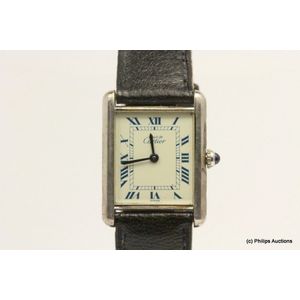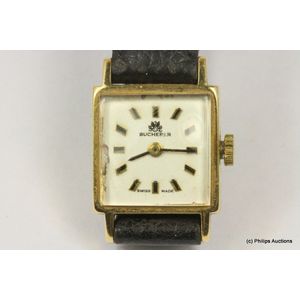Oris Automatic Moon Phase Wristwatch with Guilloche Dial
You must be a subscriber, and be logged in to view price and dealer details.
Subscribe Now to view actual auction price for this item
When you subscribe, you have the option of setting the currency in which to display prices to $Au, $US, $NZ or Stg.
- Guilloche - A form of classical decoration consisting of a repeating ornament of interlacing curved bands, sometimes forming circles, and further decorated with rosettes or other flower forms.
The name is derived from the inventor, French engineer Guillot, who invented a mechanical method of inscribing fine repeating patterns on to metallic surfaces.
On enamelled items with guilloche decoration, the surface is firstly engraved with the repeating pattern, and then covered with several layers of enamel, each of which is fired.
Where the item has not been enamelled the form of decoration is usually called "engine turned". - Movement - The technical name for the workings of a clock or watch, and does not include the dial or case.
- Date Aperture - A date aperture is a cut out section in the face of a watch or clock, displaying the day of the month.
- Moon Dial - If we imagine life in the 17th century, the only source of ascertaining the time of day or night would have been the local church or municipal clock striking every quarter hour, and able to be heard by all in the village. In England, when longcase clocks became popular and more affordable in the late 17th century, the function of timekeeping and source of time was moved to within the home.
An additional feature on some longcase clocks was to display the phases of the moon, that is the new moon, the full moon and the waning moon over the lunar 29 ½ day cycle. This information was important for farmers for working out cropping schedules; for travellers to know the amount of moonlight on a night they planned to travel; and for those who lived near the sea required knowledge of the tides.
Where included, the moon dial is usually in the form of a disc incorporated into the main dial plate, usually in the arched top section. The lunar cycle starts with the new moon displaying, which is a dark night sky and no man-in-the-moon face being displayed, and then progresses to the full moon face showing on the 15th day of the lunar cycle, and back to no face displaying as the moon wanes. Most lunar dials are partially concealed on each side of their opening in the main dial plate by semi-circular "humps" that allow the painted face to emerge slowly just as the real moon goes out of and back into the earth's shadow.
Nowadays, details of the lunar cycle is published in diaries, almanacs, and newspapers and although some modern longcase clocks are still manufactured with working moon dials, they are more for decoration than for use.
This item has been included into following indexes:
Visually similar items

A vintage Longines Ultra-Chron automatic wristwatch, square dial, centre seconds, date, 17 jewel cal. 431 movement no. 14851200, leather band working.

A gents Gruen vintage wristwatch. yellow gold cased, marked to dial, case and manual movement Gruen, with rounded square case, teardrop shaped lugs, white dial with luminous markers, two hands, sub dial, fitted to a black leather strap. N.B. Sub dial hands

A mid sized Must de Cartier wristwatch, sterling silver, marked to case back Cartier Paris tank quartz 925, case back 690006 07617, with classic slender rectangular case, ivory dial, Roman numerals, blued steel hands, fitted to original Cartier leather str

A ladies gold Bucherer wristwatch. 18ct yellow gold, marked to dial Bucherer with manual wind movement, circa 1960's, with rounded square shaped case, white dial, black and gold baton markers, two hands, fitted to a black leather strap
